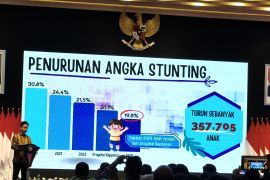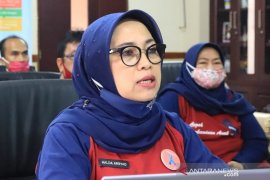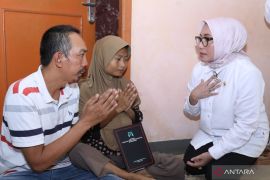What does it show? The study, titled "Quo Vadis Children's Best Interests in Marriage Dispensations," showed the high rate of child marriage dispensation requests, with 65 thousand recorded in 2021 and 55 thousand in 2022.
The study also analyzes children's access to safe spaces to voice their opinions before judges without feeling pressured as well as services available for children after the dispensation has been granted and the extent of parents' and children's understanding of the consequences of child marriages.
Influencing Director of the foundation, Nazla Mariza, stated that the study aims to see how far judges have taken into account the children's best interests in granting the child marriage dispensation.
"Involvement of the Supreme Court, Women's Empowerment and Child Protection Ministry, pioneering children, regional government, and other stakeholders in this study's launch is very important in establishing collaboration in the future to review the effectiveness of Supreme Court Regulation Number 5 of 2019 implementation in a bid to suppress the rate of child marriage," she explained.
One of the findings mentioned in the study is that the decision to grant dispensation is highly dependent on each judge's interpretation of the child's best interests.
Judges, possessing the certificate of children's rights, tend to consider children's rights in their decision, though contradicting social and gender norms often have their hold on the judges' decision.
The study, conducted from June to August 2022 in West Lombok and Sukabumi, also looks into the parents' and children's perspectives.
A teacher from Sukabumi, Resi Ajhari, 18, said that the children do not truly comprehend the impacts that marriage can bring to their lives.
"I consistently educate the peers at schools and in village about the impacts of child marriage. It turns out that the education needs to be given repeatedly to peers, who intend to marry in childhood, until they understand and cancel their plan," Ajhari emphasized.
As part of Plan International Inc, the foundation has a sponsor program for children. They have coached 26 thousand children in East Nusa Tenggara, with the aim of fulfilling five of their basic rights: birth certificate, basic vaccinations, clean water, sanitation and cleanliness, as well as education.
The foundation covers eight provinces through their programs, comprising prevention of faltering growth among children, eradicating violence towards youths, youth health, youth entrepreneurship, great school, gender-responsive disaster preparedness, as well as youth-led climate resilience.
The programs aim to develop the capacity of leadership, agency, and social initiative, so as to ensure that three million girls gain equality in terms of power, freedom, and representation.
Related news: Child marriage prevention must involve multiple parties: minister
Related news: Bolstering public education to prevent child marriage needed: ministry
Evaluating regulations
Two other research institutions also laid out their findings regarding child marriage dispensation.
Koalisi 18+ analyzes the topic by looking at documents from district courts regarding the decisions on dispensation.
On the other hand, Wahana Visi Indonesia studies about factors that contribute to the success in postponing marriage until 18 years of age, by comparing people, who marry in their childhood, to those who do not.
These studies show that Supreme Court Regulation Number 5 of 2019 about Guide on Granting Marriage Dispensation Requests should be evaluated.
Plan Indonesia also urged the Supreme Court to ensure that the judges handling marriage dispensation requests must possess children's magistrate certificate and have gender equality and children's perspectives.
The Supreme Court must also improve the quantity and quality of judges by hosting trainings and technical meetings about women facing the law and issue certificates of the juvenile crime justice system. The initiative is expected to ensure that all judges handling child marriage dispensation requests already have children's magistrate certificate.
Preventive measures
On account of the rampant occurrence of child marriages, preventive measures that need to be undertaken should also be more structured, holistic, and integrated, as well as incorporate collaborative efforts.
The collaboration involves several stakeholders, such as mass organizations, media, experts, public figures, religious figures, and the public as a whole.
"May the efforts we carry out together bring great, sustainable results to give the best lives for our children and to create 2045 Golden Indonesia," Women's Empowerment and Child Protection Minister Bintang Puspayoga affirmed.
The minister said that studies by those institutions serve as real contribution to the efforts to protect Indonesian children.
The researches have led to several recommendations for central and regional governments, Supreme Court, parents, tribal council, religious collectives, and people, so they can prevent child marriages within their capabilities, Puspayoga remarked.
She expects that the reports and studies can serve as a guide for stakeholders to formulate policies, programs, and activities to prevent child marriage. Puspayoga expressed hope that the spirit and willingness born today would not just fade away like that, and instead, be fostered for collaboration in pursuing national goals of Child-friendly Indonesia 2030 and Golden Indonesia 2045.
Acting deputy for children rights fulfillment at the ministry Rini Handayani expects the study to provide a better illustration of the child marriage situation and prompt others to recognize strategic measures that should be undertaken through relevant national strategic implementation to suppress the rate of child marriages.
Her administration hopes that good practices and recommendations issued through forums would be pursued through collaborative movement in order to tweak the system, structure, and policy, including for the law enforcement of presidential regulation on the child marriage prevention national strategy as well as evaluation on Supreme Court Regulation Number 5 of 2019.
Efforts to bring about improvements should be pursued, as they align with President Joko Widodo's mandate to the ministry regarding child marriage prevention.
The matter is of utmost urgency, as child marriage is also related to other issues in development, such as faltering growth, stunting, poverty, child labor, dropouts, and reproduction system health issues.
This is because child marriage issues do not resolve on their own after the dispensation has been granted.
Related news: Ministry seeks stronger education on impacts of child marriage
Related news: Minister stresses need for collaboration to reduce child marriage rate
Translator: Ahmad Faishal Adnan, Mecca Yumna
Editor: Sri Haryati
Copyright © ANTARA 2023












